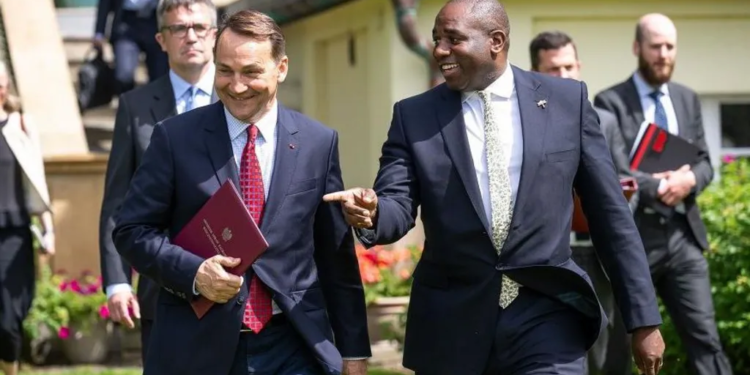David Lammy’s whirlwind first trip as Foreign Secretary, arranged at very short notice, is focused on creating the perception of a new, dynamic administration eager to engage positively with some of the UK’s key partners.
After spending an evening with his German counterpart, Annalena Baerbock, during which they managed to catch a few minutes of England’s European Championship quarter-final, Mr. Lammy’s tour continued to the scenic estate of Poland’s Foreign Minister, Radoslaw Sikorski.
Following a couple of hours of talks, Mr. Lammy boarded a plane for a brief flight north to one of NATO’s newest members, Sweden.
Why Germany, Poland, and Sweden?
Partly because of Ukraine. Along with Britain, all three countries are crucial in supporting Kyiv’s war effort. With the new Defence Secretary, John Healey, on the ground in Odesa, Prime Minister Sir Keir Starmer’s government is emphasizing that the UK’s commitment to Ukraine remains unwavering.
After meeting with President Zelensky and Defence Minister Rustem Umerov, Mr. Healey announced that the UK would provide more artillery guns, a quarter of a million rounds of ammunition, and nearly 100 precision Brimstone missiles.
“There may have been a change in government, but the UK is united for Ukraine,” he stated, promising to “reinvigorate” support with increased military aid.
He also committed to fast-tracking reinforcements to ensure their arrival within the next 100 days.
“We want to double down on our commitment to Ukraine,” Mr. Lammy said, as dragonflies swooped over a tranquil lake and a pair of majestic eagles circled overhead.
France, currently immersed in its own election with potentially significant ramifications, was not on the itinerary this weekend. Nor was there a stop in Brussels, as Sir Keir Starmer has stated the UK will not rejoin the EU “in my lifetime.”
However, Poland and Sweden are both key European partners and NATO members, making them suitable starting points for the foreign secretary to explore the contours of closer future relations.
“I want to reset both our bilateral relationship and our relationship with the European Union,” Mr. Lammy said, referencing Labour’s still somewhat undefined pledge to establish a new EU-UK security pact.
Meanwhile, during a visit to Edinburgh on Sunday, the Prime Minister indicated that efforts were already underway to improve the UK’s relationship with the EU. He asserted that his government “can secure a much better deal than the flawed one Boris Johnson burdened the UK with.”
Mr. Lammy also mentioned that when European leaders gather at Blenheim Palace on July 18 for the next meeting of the European Political Community (established by Emmanuel Macron following Russia’s invasion of Ukraine), “the new spirit of cooperation will be evident.”
Lammy’s Concerns: Russia, China, Gaza
The trip comes just days before Sir Keir Starmer takes his own first steps on the international stage as prime minister at the NATO summit in Washington, DC.
These are challenging times for strengthening relationships, with France veering to the right and the US potentially on the brink of reinstating the unpredictable Donald Trump as president.
Mr. Lammy acknowledged this “tough geopolitical moment” but emphasized the importance of not conflating disagreements among mature democracies with the threats posed by authoritarian regimes.
“I am concerned when I see Iranian drones appearing in Ukraine,” he stated. “I am concerned when I see shells from North Korea being used here on European soil. And of course, I am concerned about the partnerships Russia is forging with these authoritarian states.”
Another pressing issue on the new foreign secretary’s agenda is the war in Gaza. In Germany on Saturday, Mr. Lammy highlighted the need for a “more balanced approach to Israel-Gaza.” While his exact intentions were unclear, with ceasefire talks seemingly about to resume, finding a resolution to the Gaza conflict and revitalizing the Arab-Israeli peace process is likely to demand significant diplomatic attention in the coming months.
Mr. Lammy’s host, the anglophile Polish Foreign Minister Radoslaw Sikorski, noted that both the relatively new Polish government and the incoming Starmer administration share a common origin. Both, Mr. Sikorski said, resulted from the public’s fatigue with nationalist enthusiasm—a remark that perhaps only partially captured the essence of last week’s general election.
Mr. Sikorski expressed optimism for “a more pragmatic approach” from Britain towards its relationship with Europe and mentioned that the two ministers had discussed “some creative ideas on how to advance this.”




























